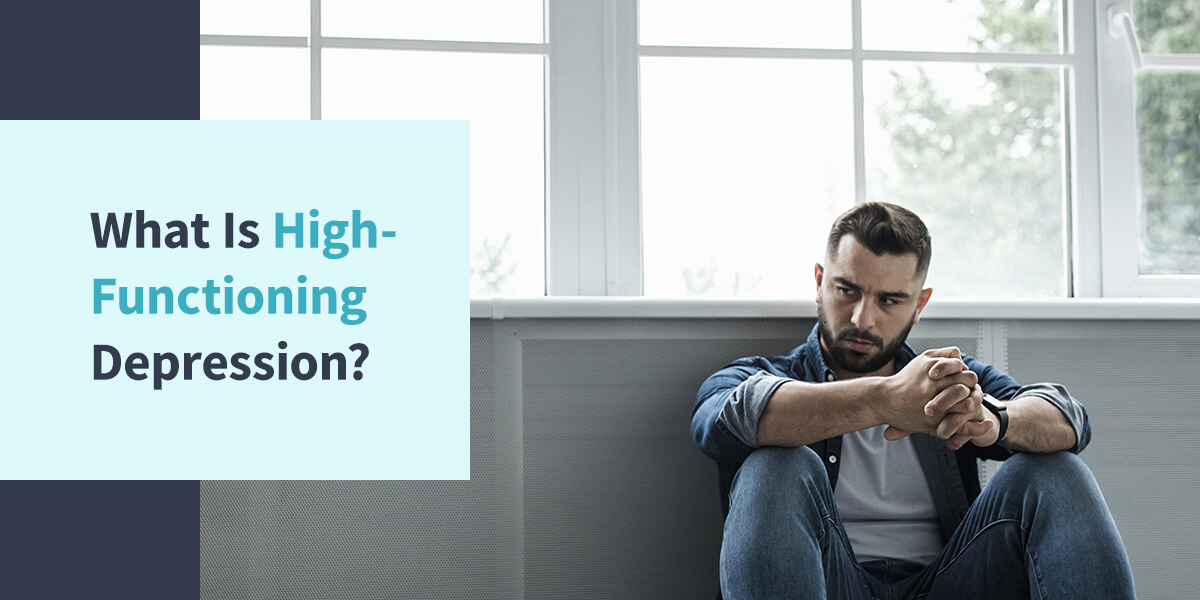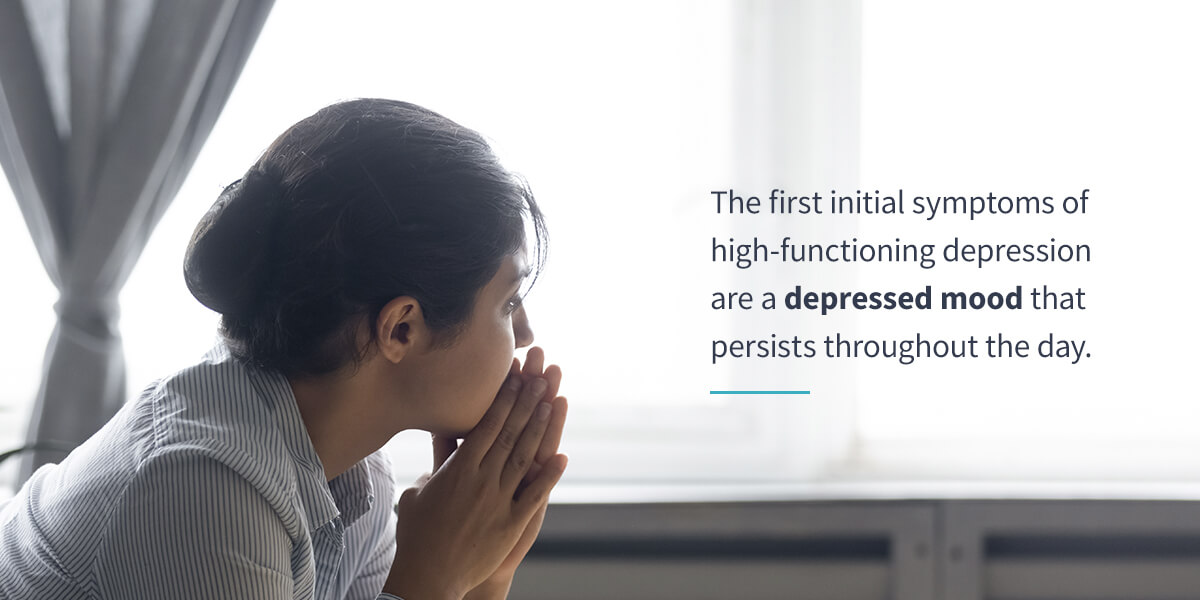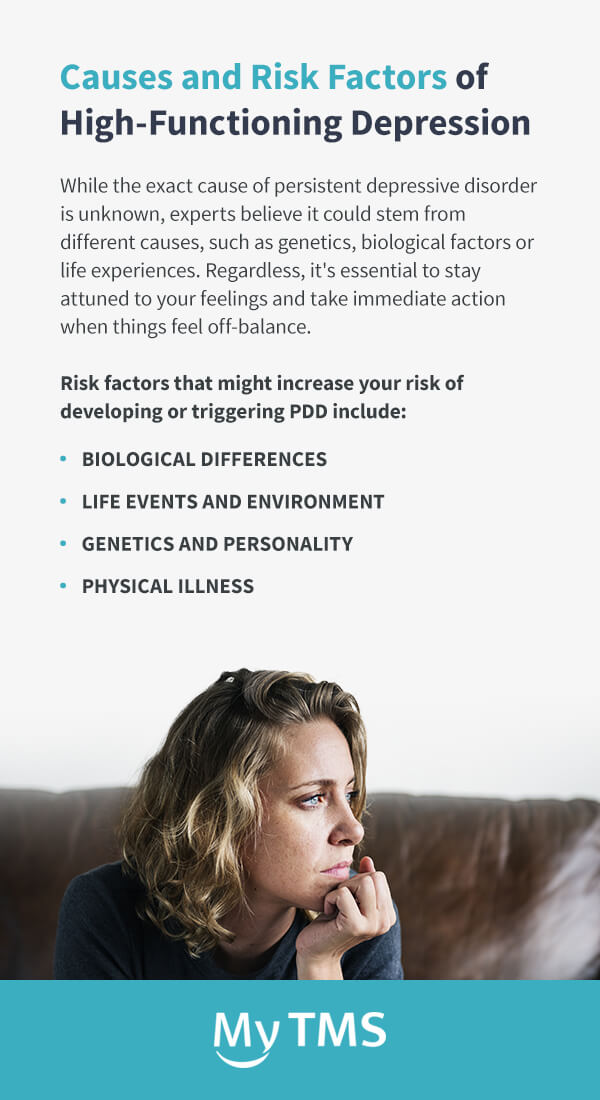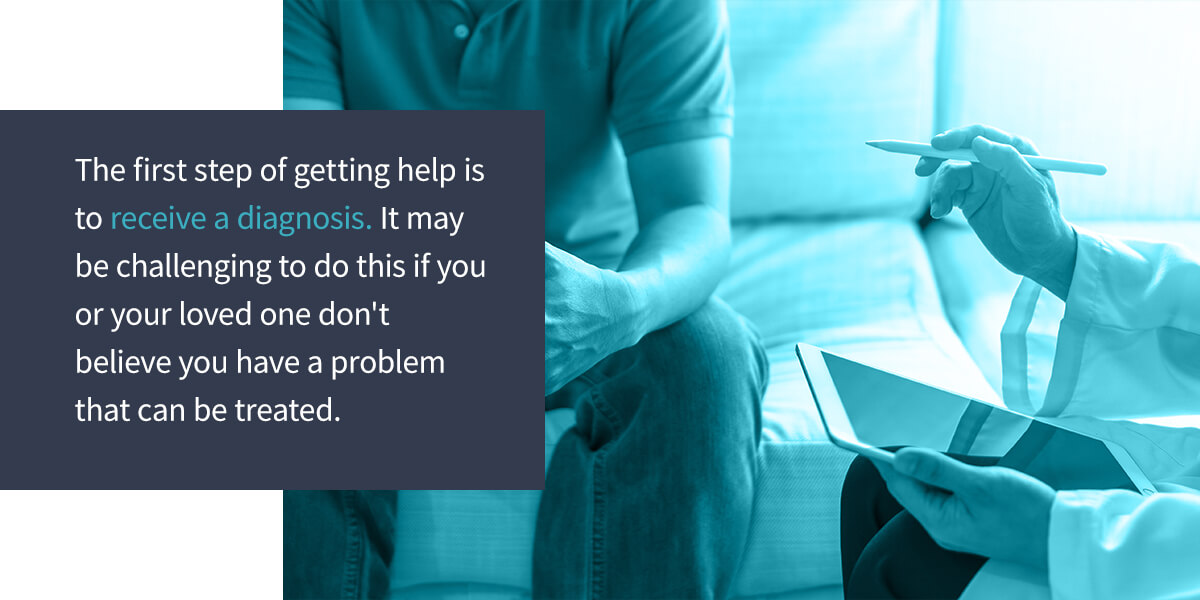
Some people suffering from high-functioning depression are diagnosed with persistent depressive disorder (PDD). Most mental illnesses impair a person’s ability to function, though people with PDD can perform well academically, go to school or work and engage in social activities.
While high-functioning depression may not seem as severe as other mental illnesses, symptoms can be lifelong and lead to severe complications if left untreated. If you or a loved one is struggling, it can be helpful to learn the causes and risk factors of this condition, how to identify high-functioning depression and treatment options to get much-needed relief.
Signs and Symptoms of High-Functioning Depression
In the United States, it’s estimated that 17% of adults suffer from major depression, while 3% have persistent depressive disorder or dysthymia. It can be tricky to spot — those who have it may appear to have their life together, while inside, they’re silently experiencing depression symptoms.
Symptoms of high-functioning depression are similar to major depression, though generally less severe. Learn the common signs so you know what to look for if you suspect you or a loved one has this disorder:
Depressed Mood

The first initial symptoms of high-functioning depression are a depressed mood that persists throughout the day. Usually, these symptoms will cause specific impairments or significant distress that disrupts your daily life. Doctors may diagnose patients with PDD if the following symptoms accompany their depressed mood:
- Feelings of sadness or hopelessness
- Insomnia or oversleeping
- Difficulty focusing on tasks or making decisions
- Reduced appetite or overeating
- Lack of energy or fatigue
- Lowered self-esteem
Persisting Symptoms
If you’ve experienced the above depressive symptoms for at least two years, doctors will evaluate you to determine if you meet additional criteria for PDD:
- Your depressed mood occurs most days for at least two years.
- You cannot achieve relief that lasts longer than two months throughout the two-year period.
- You have never experienced signs of mania or hypomania, typically characterized by energetic or euphoric mood swings.
- You have no underlying mental illness, substance use issues or medical condition that could contribute to the depressed mood.
While doctors will usually diagnose you with PDD if the symptoms last for a minimum of two years, it’s beneficial to seek professional treatment in the beginning stages. If you experience symptoms that disrupt your life and cause fatigue and other problems, you can address your concerns by going to a professional right away.
Complications
Complications and conditions linked to high-functioning depression can include:
- Poor quality of life
- Major depression, anxiety disorders and other mood disorders
- Relationship problems and family conflicts
- School or work problems
- Decreased productivity
- Chronic pain and general medical issues
- Substance use disorder
- Suicidal thoughts or behavior
- Personality disorders or other mental health disorders
Struggles of Living With High-Functioning Depression
High-functioning depression can feel like a secret battle. To the outside world, a person with high-functioning depression may seem perfectly fine. Internally, it’s a different story.
While the diagnostic criteria for PDD outlines the clinical symptoms of high-functioning depression, it can be more helpful to understand precisely what it feels like to live with this mental illness:
- You’re constantly feeling down. Close friends or family may notice and refer to you as gloomy or pessimistic.
- Your mood is always low, and you may feel as though you’ll never find relief. Any bit of happiness you experience doesn’t last long.
- You’re always tired, even when you get enough or too much sleep.
- You constantly feel worthless or as if you don’t deserve to have friends or find happiness.
- You can only find the energy to function at a normal level and you may seem lazy to others.
- You feel as if you’re “going through the motions” or numb to everyday life.
- You feel like you’re expending immense energy just by attending school or other life obligations.
- You do well in a professional setting, though focusing on most tasks comes as a challenge.
- You gain or lose weight without meaning to, due to having no appetite or unknowingly overeating.
- You engage in social activities, though socializing feels like a chore.
Some May Minimize Their Issues
Some people with high-functioning depression might downplay the seriousness of their illness and be less likely to seek treatment.
They could also be less likely to receive emotional support from others if their depression goes under the radar. Friends, family members and coworkers may not realize that the person is even struggling.
Additionally, since symptoms can include guiltiness and self-consciousness, some who experience high-functioning depression might feel unworthy of receiving help. They may believe that those with other forms of depression are more deserving of care.
Some Feel as if They Shouldn’t Be Depressed
Those struggling with PDD might also tell themselves that they have no reason to be depressed since they can function just fine. They may believe that someone with a family and a job shouldn’t be sad. These thoughts may prevent them from seeking help.
Those around the depressed person may misunderstand depression in the first place. They might think that if someone withdraws socially, they aren’t interested in being friends. Or they may label that individual’s issues with motivation as laziness.
These misconceptions can cause severe issues for someone already struggling with high-functioning depression. They may avoid others entirely or act as if they’re fine when in reality, they’re sinking further into depression.
It’s essential to recognize how PDD may also cause complications that seem unrelated. It can put you at risk of major depression or substance use disorder, relationship issues, problems at school or even chronic pain. Most people with PDD attempt to hide their depressive symptoms from others and often fail to receive help. If any of these feelings are ignored or unaddressed by a medical professional, high-functioning depression could lead to thoughts of self-harm or suicide.
If you or someone you know has thoughts of self-harm, seek emergency help immediately. The SAMHSA National Helpline can provide support if you’re struggling.

Causes and Risk Factors of High-Functioning Depression
Persistent depressive disorder is chronic and often begins in the early stages of life, such as childhood, teen years or young adulthood. You might discover how to treat your high-functioning depression by identifying the root of your issues.
While the exact cause of persistent depressive disorder is unknown, experts believe it could stem from different causes, such as genetics, biological factors or life experiences. Regardless, it’s essential to stay attuned to your feelings and take immediate action when things feel off-balance.
Risk factors that might increase your risk of developing or triggering PDD include:
Biological Differences
People with PDD may have physical differences in their brains that contribute to their illness. While the significance of these brain features is uncertain, they may help determine the causes of mental health disorders.
Low levels of naturally occurring brain chemicals or neurotransmitters such as norepinephrine, serotonin and dopamine can potentially play a role in depression. Studies have looked into how these neurotransmitters are affected by depression and interact with neurocircuits. These neurocircuits involved in regulating mood stability could trigger depressive symptoms and help pinpoint future treatment methods for persistent depressive disorder.
Since everyone has different brain chemistry, it can be challenging to determine the exact cause of depression. This is why therapy can be an effective individualized treatment method.
Life Events and Environment
If you are biologically predisposed to developing depression, major life stressors can increase your chances even more so. Stress, unresolved grief, illness, substance use issues and significant life transitions are just a few reasons someone might become depressed. Researchers have also discovered a link between childhood trauma and developing depression later in life.
Trauma can cause negative changes in mood, such as an inability to feel happiness or trust anyone. Behaviors such as avoiding certain places or situations to escape memories of trauma can lead to isolation and worsen symptoms of depression.
Circumstances that can lead to or worsen depression might include:
- Loss of a loved one
- Trauma from physical or mental abuse
- Witnessing a traumatic event
- Financial difficulties or losing a job
- Relationship issues
- End of a romantic relationship
- Moving into a new home
- Compromised housing
- Experiencing crime or community violence
- Retirement
- Diagnosis of a chronic illness
- Problems at school or work
- Spending time in the criminal justice system
Genetics and Personality
Your chances of inheriting PDD can increase if you have a first-degree relative suffering from a major depressive disorder or other forms of depression.
Your personal history and personality can also play a part. Some individuals with a “type A” personality may develop high-functioning depression. “Type A” individuals are associated with a competitive nature and being strictly organized. Other traits that might increase your risk include:
- Toxic productivity or the desire to be productive at all times, even to the detriment of your physical and mental health.
- Young age.
- A tendency to be a people-pleaser or the desire to be perceived as strong and capable.
- Low self-esteem or pessimism.
- History of other mental health disorders, such as a personality disorder.
Physical Illness
People who suffer from high-functioning depression may also experience health issues such as thyroid disorders or migraines. These physical health problems can cause low mood by affecting your blood sugar levels or day-to-day life.
Those with existing chronic illnesses may also develop PDD or other types of depression as a result of their illness’s symptoms. Examples of chronic illness that might cause depression include:
- Diabetes
- Kidney disease
- HIV and AIDS
- Heart disease
- Arthritis
- Multiple sclerosis (MS)
- Lupus
Treatment Options for High-Functioning Depression
Even if you feel high-functioning, PDD can still cause functional impairment and significantly impact your quality of life. While recognizing the signs isn’t always easy, getting help is essential to improving your mood and achieving a better outlook on life in general.
Fortunately, several effective treatment options for high-functioning depression can help alleviate symptoms and get to the root of your problems. It’s helpful to seek treatment at the onset of symptoms to prevent complications.

The first step of getting help is to receive a diagnosis. It may be challenging to do this if you or your loved one don’t believe you have a problem that can be treated. If you have a loved one struggling with this disorder, you might be able to help point out concerns so they can receive professional attention. Once you’re diagnosed, clinicians might treat PDD with a combination of medications and therapy.
Medications
Some medications can help alleviate symptoms of high-functioning depression, such as antidepressants or selective serotonin reuptake inhibitors (SSRIs).
SSRIs work by increasing serotonin levels in the brain. Serotonin is a neurotransmitter responsible for regulating happiness, anxiety, sleep and other body functions.
Antidepressants can help lift your mood, though they often take several weeks to begin working. Additionally, it may take a few tries to determine the most effective type of medication for your needs.
Therapy
Cognitive behavioral therapy (CBT) or transcranial magnetic stimulation (TMS) might also improve your high-functioning depression symptoms. Therapists can help you discover how to manage high-functioning depression symptoms, and they can also help you get to the root of your issues to more easily solve them.
In cognitive behavioral therapy, patients learn to recognize harmful thought patterns and practical ways to overcome and change them. Outpatient therapy programs can help, while others might require intensive, all-encompassing therapy in residential programs.
TMS is another form of treatment that can address mental illnesses like anxiety and depression by stimulating nerve cells in the brain. TMS has shown considerable therapeutic potential in treating various mental diseases, with research evolving.
Prevention Strategies
While receiving therapeutic or medicinal help for your high-functioning depression, you can also ward off symptoms with the following strategies:
- Take steps to relieve stress: You can do several things to increase your mental resilience and reduce the stress that can trigger symptoms of depression. This might include daily exercise, following a healthy diet or practicing yoga and mindfulness meditation.
- Reach out to friends and family: Loved ones can help you through tough times, such as stressful life changes or events that affect your mental health.
- Get treatment as early as possible: Take note of your mood and seek treatment to prevent worsening symptoms.
- Consider long-term maintenance treatment: Since high-functioning depression can be lifelong, attending therapy or TMS can help maintain a better quality of life.
High-functioning depression can be tricky to identify at first. Most people might not consider themselves depressed or even feel worthy of receiving treatment, no matter how challenging their symptoms are. While this mental illness might not seem as severe as others, it can impact your happiness, quality of life and ability to provide for yourself and your family, so it’s essential to reach out for help.
Book an Appointment to Treat Your High-Functioning Depression
Managing high-functioning depression can be an uphill battle as you attempt to regain control of your life and happiness. While coping can be difficult, it’s essential to know that you are not alone.
At My TMS Therapy, we are dedicated to providing high-quality, relevant care to various types of mental illness. Our board-certified clinicians and psychiatrists in Florida offer relief in the form of TMS therapy, a noninvasive, safe and effective treatment. We’ll work with your needs and lifestyle to determine the best course of treatment for you.
To learn more or book an appointment, contact us today.


